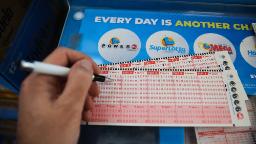New York
CNN Business
—
If residents of Alabama, Utah, Alaska, Hawaii or Nevada wanted a chance to win this week’s record Powerball jackpot, they had to travel to another state to buy a ticket.
These five states do not offer government-operated lotteries or participate in interstate drawings with rollover jackpots such as Powerball or Mega Millions. They are the last remaining lottery holdouts in America.
Since 1964, when New Hampshire became the first to offer a state lottery, 44 states have started their own or joined multi-state jackpots. (Mississippi was the most recent state to add lotto games in 2019.)
States, often under budget pressures, introduced lotteries as a way to add revenue without raising taxes. They found willing partners in gambling companies that benefit from running lottery games.
More than 200,000 retail stores and other outlets in the United States sell lottery tickets. In 2019, lottery sales topped $91 billion, according to the North American Association of State and Provincial Lotteries.
But the five holdouts have a number of reasons why they haven’t joined the rest of the country in adopting state lotteries.
Alabama and Utah prohibit gambling in their state constitutions, and religious groups in these conservative states have for years blocked efforts to legalize casinos or adopt lotteries.
Utah, where more than 60% of the the state’s population are members of the Church of Latter Day Saints, has long opposed a lottery.
Efforts to add a lottery have gained strength in Alabama, however, and the state could be getting closer to adopting one.
“Alabama has been trying to pass a lottery since the election of Don Siegelman as governor in 1998. Churches helped defeat a lottery referendum the following year,” said Jonathan D. Cohen, author of “For a Dollar and a Dream: State Lotteries in Modern America.”
Now, 24 years later, “I think they might be serious this time, as Mississippi finally got its lottery act together,” he said.
In Nevada’s case, public lotteries have been blocked by the powerful casino industry, which views sales of lotto tickets in convenience and grocery stores as competition — even though many stores have slot machines instead of lottery tickets.
In the past,…
Click Here to Read the Full Original Article at CNN.com – RSS Channel – HP Hero…

